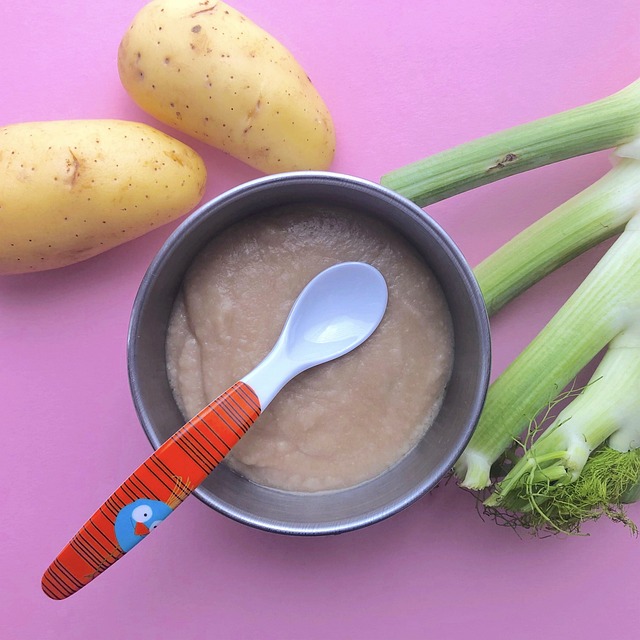Baby Food Purees (Stage 1)
Baby Food Purees-As a parent or caregiver, you may be wondering how to introduce solid foods to your baby. This is an important step in your baby’s development. Babies who are introduced to solids earlier have better health outcomes, including increased weight and length gain, reduced risk of allergies and asthma, and decreased risk of developing type 2 diabetes.
The American Academy of Pediatrics (AAP) recommends that all babies be exclusively breastfed for about six months. After that time, they should continue breastfeeding while gradually being introduced to solid foods.
The AAP recommends introducing one new food at a time so that if there is an allergic reaction it can be identified quickly. Starting with Stage 1 purees will make this process easier for you and your baby by making sure your baby is getting the nutrients he or she needs from the foods he or she likes best.
Here is a list of 10 baby food purees you should start practicing right away! Each recipe contains around 4-5 servings. You will need a blender and the ingredients listed below. Enjoy!
Ingredients:
1/2 cup applesauce
1/2 cup bananas
1/2 cup blueberries
1/2 cup broccoli florets
1/2 cup carrots
1/2 cup cauliflower florets
1 cup peas
1/2 cup raspberries
1/2 cucumber
1/2 cup edamame beans
1/2 cup green beans
1/2 zucchini
- Honey
Honey comes from bees collecting nectar from flowers. There are many different types of honey but the two most popular ones are raw honey and dark honey. Raw honey is a natural unprocessed type that is high in minerals and vitamins while dark honey contains antioxidants and anti-inflammatory properties. Dark honey is often considered healthier than regular raw honey due to its additional nutrients. Try adding honey to your baby’s food to give him/her some added nutrition. You can use the following amounts:
- ¼ cup per bottle
- ½ cup per jar
- ⅓ cup per bowl
- Rice Milk
Rice milk is made from ground rice mixed with water and sometimes fortified with additional ingredients. It is a great alternative to cow’s milk, but not everyone likes the taste! If you want to try making your own rice milk, start out with white basmati rice. Once cooked, drain off any excess liquid then add cold filtered water until the mixture reaches the desired consistency. To fortify the milk, add one tablespoon of vanilla extract, cinnamon, nutmeg, or cocoa powder to enhance flavor.
- Plain Yogurt
Yogurt is a dairy product that is made from yogurt starter culture cultures grown on milk protein and skimmed of fat. The amount of acidity depends on the quality of the milk. Yogurt is low in fat and cholesterol but offers a lot of probiotics for your baby. Add plain yogurt to baby’s food to increase the intake of good bacteria. Start with two ounces per day at first and work up to four ounces each week.
- Cottage Cheese
Cottage cheese is made by straining fresh milk to remove the cream. It is similar to ricotta cheese in texture and taste but is lower in fat content. Try cottage cheese as a topping on fruit or vegetables, or even make your own flavored varieties using fruits, herbs, spices, etc.
- Water
Water is necessary for your baby’s survival and should always be present in adequate quantity. Make sure your baby drinks enough fluids throughout the day to avoid dehydration.
- Canola oil
This is the first puree that we would recommend using for baby food. It is rich in monounsaturated fatty acids and contains oleic acid that may help nourish skin and hair follicles. It also contains vitamin E that helps protect against oxidative damage.
- Potato
The potato is great for babies because it is high in protein and iron. Being a root vegetable, it is a good source of zinc, which is necessary for healthy vision and the nervous system. Additionally, the vitamin C contained in potatoes is very helpful for immune function.
- Carrot
Carrots have been shown to increase brain function and motor skills in children. They also contain beta-carotene, which the body converts to Vitamin A. This helps prevent infections and boosts immunity. Beta carotene is also known to reduce lung cancer risk.
- Avocado
Avocados are full of essential fats and vitamins that are perfect for baby’s developing bodies. It contains lutein and zeaxanthin, antioxidants that aid eye development. These phytonutrients also play a role in preventing degenerative conditions. In addition, avocados provide high levels of dietary fiber and folate, both of which contribute to healthy digestive systems.
- Banana
Bananas are packed with potassium, making them ideal for helping baby maintain a healthy heart rate. They also contain copper, which is critical to proper functioning of the brain, lungs, bones, and many other systems. Bananas also contain vitamin B6, which promotes normal blood sugar levels and is useful for proper thyroid activity.
- Pear & Apple
Pears and apples do not only taste delicious but they are also nutritious for baby. Apples have been shown to improve vision. Pears contain a number of essential vitamins and minerals including vitamin K, which aids in bone formation and prevents bleeding and bruising. They contain some fiber, too!
- Peanut Butter
Peanuts contain high amounts of protein and fat. Protein builds strong muscles while fat keeps you satiated throughout the day. Peanuts also contain unsaturated fatty acids that are excellent for brain development.
Baby food
Baby foods are the best way to bring nutrition into your baby’s diet. These meals are specially formulated to help babies get the right balance of vitamins and nutrients they need at their age. When choosing your baby’s first food, ensure it contains iron and zinc. Iron is an important mineral for brain and nervous system development. Zinc helps with digestion and protein synthesis.
Good quality baby food should have no artificial colours or preservatives. Your baby may even enjoy different flavours, including milk-based recipes. There are many brands of ready-made baby food out there; however, homemade versions taste much better. You can make your own using low fat dairy products, fresh fruit, vegetables and meat, and keep the recipe simple. If you’re not sure what your child likes, try some of these delicious ideas!
Banana
Bananas are great for any time of day. They can be enjoyed alone, mixed into cereal or smoothies, added to baked goods, eaten straight off the peel, or eaten plain as breakfast. Bananas are rich in fibre and potassium. Potassium is needed for muscle contraction, heart function, nerve transmission, bone formation and blood pressure regulation. Bananas are also packed full of vitamin B6, folate and vitamin C. Vitamin B6 is a water soluble vitamin, meaning your body absorbs it easily.
Folate is an antioxidant, which means it fights free radicals in the body, helping reduce the risk of cancer. As a bonus, bananas are also bursting with natural sugar, making them perfect for keeping the hunger pangs at bay. A handful of banana slices is enough to satisfy cravings for hours!
Blueberries
Blueberries are jam-packed with antioxidants. Antioxidants are substances that protect our cells from oxidative damage and prevent chronic disease. They do this by neutralizing free radicals before they cause harm. Free radicals are unstable molecules that have unpaired electrons. Unpaired electrons are considered dangerous because they are highly reactive. Free radicals can lead to premature aging of skin, hair loss and dry eyes.
In addition to being loaded with antioxidants, blueberries are also rich in phenolics. Phenolics are compounds that act as anti-inflammatory agents. Phenolics can help ease joint pain and swelling associated with arthritis. Blueberries are also a good source of copper, manganese and selenium.
Copper is an essential trace mineral that works with zinc to stimulate the production of red blood cells. Manganese assists in regulating insulin level and maintaining bone density. Selenium boosts the immune system and protects against cardiovascular disease.
Broccoli
Broccoli is a member of the cabbage family and is extremely nutritious. Its green color comes from its high concentration of anthocyanins, antioxidants that give broccoli its bright hue. Anthocyanins play a role in reducing inflammation, protecting against breast, prostate and colon cancers, and preventing vision problems. Broccoli also provides a wealth of antioxidants, vitamins, fibre and minerals.
Broccoli is a great source of thiamin and riboflavin, which play a vital role in converting carbohydrates into glucose and thus promoting energy. Vitamin C is necessary to produce collagen, a strong protein that makes bones and connective tissue. Fibre contributes to proper bowel function and keeps blood sugar levels stable. Broccoli also offers a good amount of vitamin A, which supports the immune system and promotes healthy vision.
Cantaloupe
Cantaloupes contain lycopene, a carotenoid pigment that gives the melon its deep red colour. Lycopene is a potent antioxidant that reduces the risk of certain types of cancer, including prostate cancer. It is known to reduce the risk of several types of cancer, including those of the stomach, liver, pancreas, lungs and possibly prostate. Lycopene also helps protect the body against damage caused by free radicals, so eating cantaloupe regularly could benefit your health in more ways than one.
Other phytonutrients found in cantaloupes include lutein, zeaxanthin and capsaicin. Lutein and zeaxanthin are antioxidants that combat the effects of short wave ultraviolet radiation that damages skin and increases the likelihood of sunburn. Capsaicin, the spice responsible for giving chili peppers their kick, has been shown to slow down the growth of tumours. It also enhances immunity and may help protect against Alzheimer’s disease.
Cherries
Cherries have a sweet flavour and are well worth trying when in season. The tart cherry is the most commonly grown variety of cherries around the world. Like other stone fruits, cherries are very rich in vitamin C, vitamin E and dietary fibre. They are also a good source calcium and potassium.
Calcium is needed to build strong teeth and bones, while potassium is useful for muscle contraction and nerve impulse conduction. Cherries have also been proven to have antibacterial properties. Research conducted by researchers at the University of Illinois shows that the compound ellagic acid present in cherries inhibits bacterial growth.













No comments:
Post a Comment